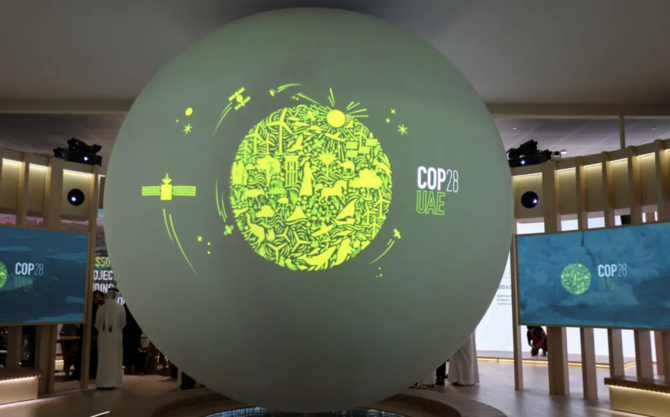
- ARAB NEWS
- 14 Jul 2025

The debate about climate change is often unremittingly bleak, given the existential threat that global warming poses to the planet. However, with the 2023 UN Climate Change Conference, COP 28, just two months away, a rare ray of hope and optimism emerged early this week in an agenda-setting report from the International Energy Agency.
A headline finding was that, unexpectedly, a small “window of opportunity” remains for keeping the landmark Paris Climate Accords alive. This is a result of the remarkable growth in the generation and use of clean power. More specifically, solar power capacity and electric car sales have risen broadly in line with what the agency perceives is necessary to achieve the 2050 target of limiting the increase in global temperatures to no more than 1.5 degrees Celsius above pre-industrial levels, as was agreed in Paris in 2015. Temperatures hit record levels this year in much of the world, and global averages are already about 1.1 C higher than pre-industrial averages.
The IEA predicted that increased solar power capacity and electric car sales would supply about a third of reductions in emissions between now and 2030. Meanwhile, tech innovations continue to open up new possibilities and reduce costs.
The progress this implies is showcased by a comparison with the IEA’s 2021 report. Just two years ago, the agency highlighted the fact that technologies that could potentially account for 50 percent of future reductions in emissions were not yet on the market. This year’s report reveals that the figure has fallen to 35 percent, a testament to the pace at which renewable energy technologies are developing.
Positive as this is, however, the IEA said that even stronger measures would be required in the second half of the 2020s to deliver on the 1.5 C target. The agency sounded a warning about the negative effects of increased fossil fuel investments, and what it described as “stubbornly high emissions” after the post-pandemic economic rebound, along with the energy crisis driven by the war in Ukraine.
A number of things are needed, according to the IEA, including no less than a tripling of the capacity of renewable energy internationally; a big increase in use of electric cars and heat pumps; a 75 percent reduction of methane in the energy sector; and a doubling of the annual rate of energy efficiency enhancement.
One indication of how high these hurdles will be is that global investment in energy efficiency is already expected to reach a record $600 billion this year. To this end, the IEA used its latest report to issue a “Net Zero Road Map” that charts potential pathways to success for this agenda. It is a multifaceted approach with key elements for both advanced economies and those in the developing world.
The COP 28 climate summit in Dubai represents a pivotal moment in the climate change battle.
Andrew Hammond
In advanced, industrialized economies, the agency calls on as many nations as possible to deliver net zero targets in 2045, five years earlier than the 2050 deadline, thereby providing developing countries with a bigger window of time to make their transitions.
The IEA makes clear that no new coal, gas, or oil projects are needed, as new fossil fuel development is incompatible with the 1.5 C target, although some investment will be required in projects already given the green light.
What is key, however, is that the clean energy revolution continues apace, with forecasts of fossil fuel demand peaking soon and then reducing by 25 percent around 2030, and by 80 percent by the middle of the century.
To deliver on this lofty ambition, the IEA said investment in clean energy must increase from approximately $1.8 trillion this year to about $4.5 trillion annually by the early 2030s. While advanced nations are driving the energy transition, the agency highlighted a particular need for developing countries to embark on this journey at a faster rate.
This will necessitate about $45 billion of investment to provide all developing nations with full access to modern sources of energy. To put this number into context, it is equivalent to about 1 percent of aggregate annual global investment in energy.
If the world fails to increase the use of clean energy quickly enough, the IEA warned that measures such as carbon capture and storage technology would be required, but these are as yet unproven at scale. In such a scenario, the agency said, about 5 billion tons of carbon dioxide will need to be removed from the atmosphere each year during the second half of the century.
With the momentum growing behind key global targets, such as the tripling of renewable energy capacity, the IEA said that the COP 28 climate summit in Dubai therefore represents a pivotal moment in the climate change battle, and called on all nations to commit during the event to greater ambitions and delivery of results in the half-decade ahead.
The agency, rightly, highlights the fact that perhaps the greatest challenges are likely to be political rather than economic in nature. Therefore, it said, strong international cooperation is now critical between nations around the world, including the US and China, and there is a need to disentangle climate diplomacy from geopolitics, given the scale of the challenge at hand.
The IEA is right to highlight this point. It is sometimes forgotten that a precursor to the 2015 Paris treaty was a bilateral climate deal between Beijing and Washington a year earlier. That accord was struck at a time when the relationship between US President Barack Obama and his Chinese counterpart, Xi Jinping, was relatively genial, despite periodic tensions.
Taking all of this together, the world therefore finds itself at a historic tipping point. While the IEA report offers some welcome news, the next steps in the delivery of results will be even harder and require an easing of geopolitical tensions, post Russia’s invasion of Ukraine, that will call for some remarkable, enlightened diplomacy.